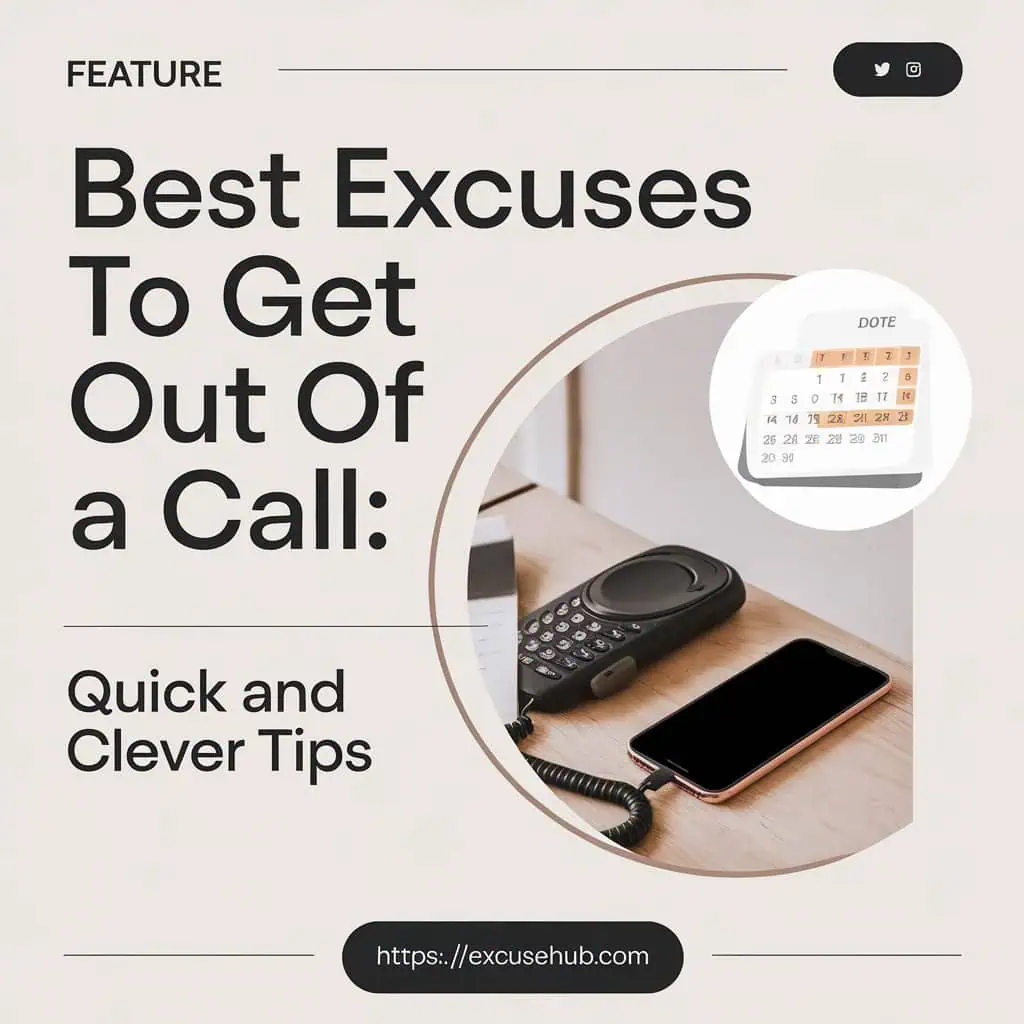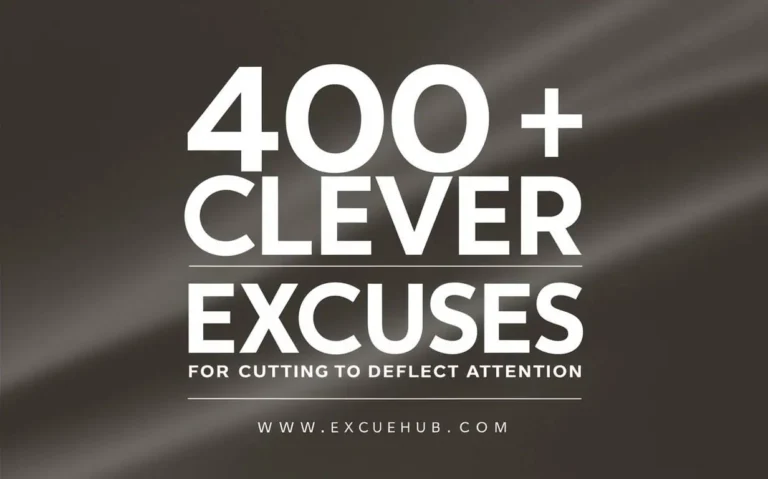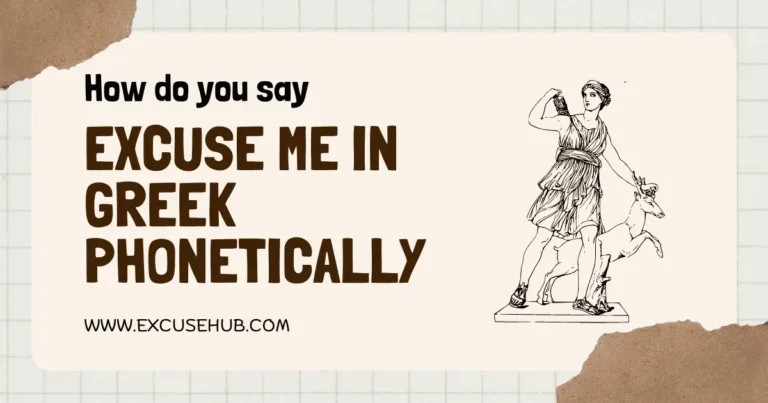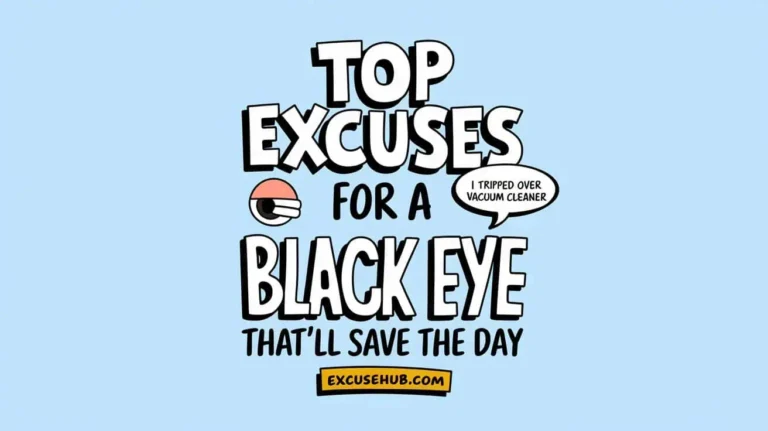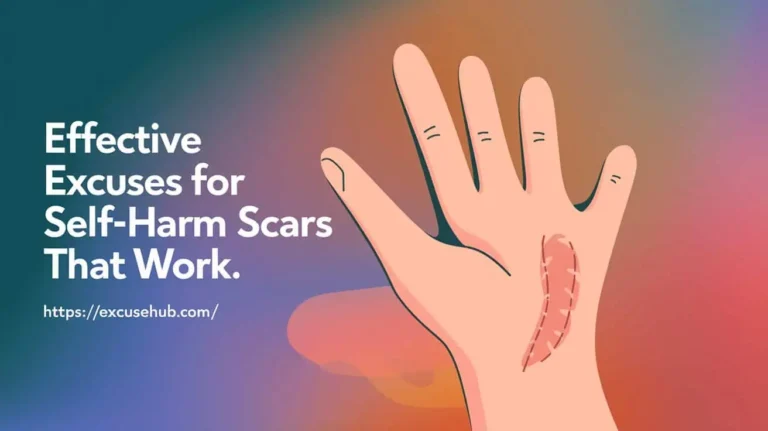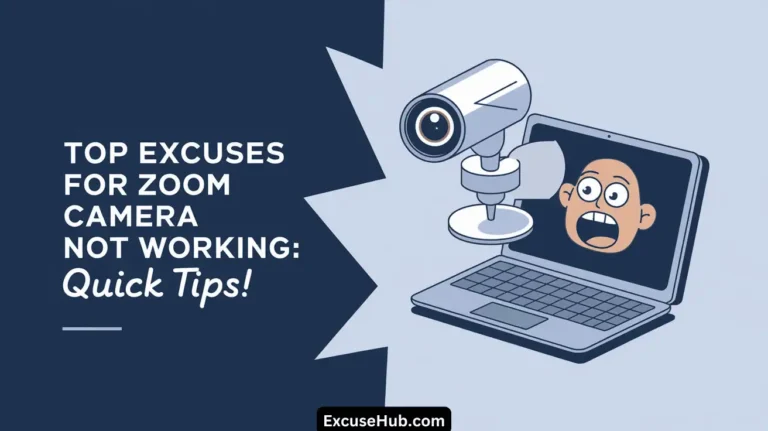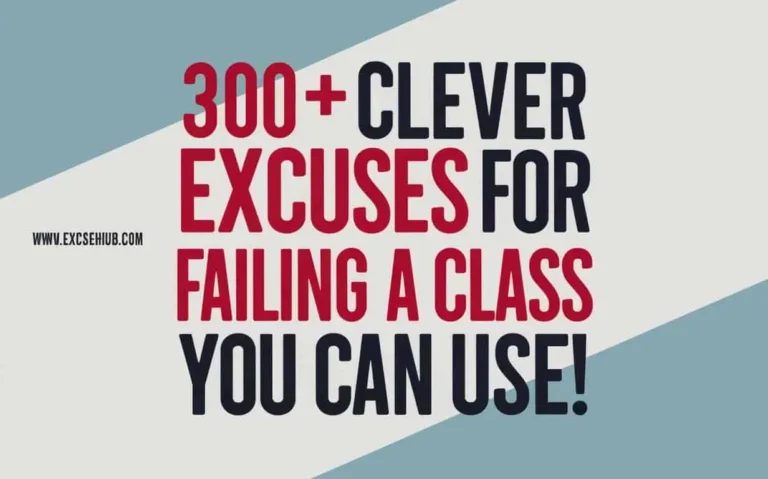Best Excuses to Get Out of a Call: Quick and Clever Tips
If you need to get out of a call, there are plenty of believable excuses you can use. Excuses to get out of a call, such as claiming unexpected car trouble or a sudden health issue, often work well. You might mention an urgent family matter or a pet emergency that requires immediate attention.
Technical problems can also serve as a valid reason, like internet connectivity issues. Just be sincere in your delivery to maintain professionalism.
Offering to reschedule shows you still value the conversation. Feeling intrigued? There are more effective strategies and templates to contemplate for your next situation
Excuses to Get Out of a Call: Effective and Easy Solutions
Sometimes, finding a polite way to decline a call can be challenging. Whether it’s due to an unexpected conflict or just needing some personal time, having a few well-crafted excuses can make the situation smoother.
In this guide, we’ll explore effective and easy solutions for excuses to get out of a call, helping you navigate these situations with ease and professionalism.
From technical issues to personal emergencies, learn how to handle these scenarios gracefully while ensuring you maintain your integrity and keep the door open for future conversations.
Navigating a situation where you need to skip a call can be tricky, but having a set of believable excuses at your disposal can help you manage these scenarios smoothly. Here’s a guide to some effective and easy solutions to help you get out of a call while maintaining professionalism:
1. Technical Issues
- Example Excuse: “I’m currently experiencing some technical difficulties with my phone/computer and am unable to join the call. Can we reschedule for a later time?”
- Why It Works: Technical problems are common and often unavoidable, making this a credible excuse. It also allows you to propose an alternative time to talk, showing you’re still interested.
2. Unexpected Car Trouble
- Example Excuse: “I’m dealing with some unexpected car trouble right now and need to handle it immediately. Can we arrange another time to discuss this?”
- Why It Works: Car trouble is a common and understandable issue. It suggests a genuine, immediate problem, which helps in maintaining the appearance of sincerity.
3. Health Concerns
- Example Excuse: “I’m not feeling well and think it’s best if I rest for now. I’m sorry for the inconvenience. Can we reschedule our call for another day?”
- Why It Works: Health issues are universally recognized and usually not questioned, making it a reliable excuse. It’s important to be careful with this excuse to avoid overuse.
4. Urgent Family Matter
- Example Excuse: “I’ve just received news of an urgent family matter that requires my immediate attention. I apologize for the short notice. Could we find another time to talk?”
- Why It Works: Family matters are generally respected and understood, especially if they are framed as urgent. This excuse shows a priority for personal responsibilities.
5. Pet Emergency
- Example Excuse: “My pet is having a sudden emergency, and I need to take them to the vet right away. I’m really sorry for the disruption. Let’s reschedule our call.”
- Why It Works: Pet emergencies can be quite convincing and relatable, as many people are empathetic towards pets. This excuse helps convey that you are dealing with an unforeseen issue.
6. Prior Commitment
- Example Excuse: “I have a prior commitment that I can’t reschedule. I’m sorry for the inconvenience. Can we arrange another time to talk?”
- Why It Works: A prior commitment is a straightforward and believable reason, making it suitable for situations where you need to decline a call without going into details.
7. Scheduled Overlap
- Example Excuse: “I have a meeting that has run over time, and I need to address it immediately. I apologize for the overlap. Can we schedule our call for another time?”
- Why It Works: Overlapping schedules are common and understandable. This excuse is practical and suggests that you have a legitimate reason for not being available.
Tips for Using Excuses Professionally:
- Be Sincere: Regardless of the excuse, it’s important to deliver it honestly and professionally.
- Offer Alternatives: Whenever possible, propose an alternative time for the call to show that you still value the conversation.
- Avoid Repetition: Overusing the same excuse can come across as disingenuous. Try to vary your reasons when needed.
By utilizing these strategies, you can manage your schedule effectively while maintaining professionalism and respect for others’ time.
Top 10 Most Believable Excuses for Work Calls
When you’re staring at the clock and dreading that upcoming work call, having a few believable excuses up your sleeve can be a lifesaver. Effective communication strategies are essential, especially when managing expectations with your team.
Here are some top excuses that can help you gracefully bow out of that call:
- Technical Issues: Mention you’re experiencing internet connectivity problems.
- Unexpected Visitor: Say a colleague or client dropped by unexpectedly.
- Health Concerns: A quick mention of a sudden headache or fatigue can go a long way.
- Prior Commitment: Claim you have a scheduling conflict that you can’t avoid.
Using these excuses can help ease your anxiety while maintaining professionalism.
Remember, the goal is to communicate effectively without burning bridges. Just make sure you don’t overuse them, as trust is key in any work environment.
If you find yourself constantly dodging calls, it might be time to reevaluate your workload or speak openly with your supervisor. Balancing your tasks and communicating your needs can create a more manageable work experience, allowing you to handle those calls with confidence when they do occur.
Common Excuses for Family Emergencies
Family emergencies can pop up unexpectedly, often leaving you in a tough spot when it comes to managing your commitments. When faced with urgent obligations, you might need to rely on a few common excuses to gracefully bow out of calls.
Here are some believable reasons you can use:
- Unexpected family issues: Mentioning that a relative needs your support can effectively communicate the seriousness of the situation.
- Medical emergency: This can be a powerful excuse, whether it’s a sudden illness or urgent appointment that requires your attention.
- Childcare needs: If you have children, stating that you need to handle a situation with them is relatable and often understood.
- Home repair crisis: You can explain that a critical issue at home, like a broken pipe, demands your immediate attention.
Using these excuses not only helps you maintain your commitments but also shows that family comes first.
Just remember to communicate clearly and sincerely, as most people will understand that family emergencies can arise at any moment.
Balancing your personal and professional life is essential, and making room for family is always a priority.
Pet Emergency at Home
A pet emergency at home can arise without warning, leaving you scrambling to handle the situation.
Whether your furry friend has ingested something harmful or is showing signs of distress, your priority is their health. In such cases, you may need to contact an urgent vet immediately.
Here’s a quick reference table to help you identify common pet emergencies:
| Emergency Type | Signs to Look For | Immediate Action |
|---|---|---|
| Ingestion of Toxins | Vomiting, drooling, lethargy | Call an urgent vet |
| Difficulty Breathing | Wheezing, open-mouth breathing | Seek emergency care |
| Severe Bleeding | Excessive bleeding from any area | Apply pressure, call vet |
| Unconsciousness | Limp body, unresponsive | Rush to the nearest vet |
In moments like these, you can’t afford to be on a call. Explain your situation briefly, and don’t hesitate to reschedule. Your pet’s health is your top priority, and any delay in seeking help could lead to serious consequences. Remember, a quick response can make all the difference in an emergency!
Unverifiable Medical Appointments
Sometimes, life throws curveballs your way, and unverifiable medical appointments can be one of them. You might find yourself in a situation where you need to make an urgent care visit at the last minute, and that’s a perfectly valid reason to miss a call.
Whether it’s a sudden illness or an unexpected injury, saying you have a medical appointment can help you bow out gracefully.
The beauty of unverifiable medical appointments is that they require little to no proof. Unlike a scheduled visit, you don’t have to provide details about what’s wrong or who you’re seeing. You can simply mention you need to head to urgent care for something that just cropped up.
This excuse isn’t only believable but also relatable—everyone understands that health sometimes takes priority. Additionally, if you ever feel pressured to provide further information, you can say you’re seeing a specialist or that it’s a follow-up.
Just remember to keep it vague to maintain the mystery. So, when you’re stuck in a situation where a call feels like too much, an unverifiable medical appointment can be your perfect out.
Unexpected Car Trouble
When your car suddenly breaks down or refuses to start, it can throw a wrench in your plans—and provide an excellent excuse to skip a call.
You can easily explain that you’re dealing with unexpected car trouble. Most people understand that vehicle issues happen out of the blue, and they’ll likely sympathize with your situation.
If you’re stuck on the side of the road, calling for roadside assistance can help you handle the situation with minimal fuss.
Whether you’re waiting for a tow or a jump start, it’s a legitimate reason to postpone that call. You can say something like, “I’m really sorry, but my car just broke down, and I need to deal with the repair.”
Additionally, if you’re at a garage waiting for car repair, you can use that to your advantage too. Mention that you’re at the mechanic’s and can’t talk until you get a clearer view of the situation.
Most people won’t question your car troubles, giving you the perfect opportunity to reschedule the call without raising any eyebrows.
Tone and Body Language
While you might have a valid reason to skip a call, the tone and body language you convey during the conversation can make a significant difference. Your tone interpretation can reveal your true feelings, even if your words say otherwise. If you sound uninterested or distracted, it could lead to misunderstandings or hurt feelings.
Here’s a quick glance at how tone and body language cues can impact your communication:
| Tone of Voice | Body Language Cues |
|---|---|
| Calm and friendly | Open posture, relaxed hands |
| Defensive or harsh | Crossed arms, avoiding eye contact |
| Engaged and enthusiastic | Leaning forward, nodding |
Using an approachable tone and positive body language can help you steer through tricky conversations.
If you’re genuinely unable to chat, practice conveying sincerity through your voice, and use open body language to soften your message.
This way, you can maintain relationships while respectfully declining calls. Remember, it’s not just what you say, but how you say it that counts.
Text Message Templates
Crafting the right text message to excuse yourself from a call can be a delicate balance between honesty and politeness. You want to maintain good relationships without feeling too guilty about skipping that conversation.
Here are some text message templates that strike that balance.
For a straightforward approach, you might say, “Hey! I’m really sorry, but I’ve got to take care of something urgent. Can we chat later?” This keeps it simple and respectful.
If you prefer a touch of humor, try something like, “I’d love to chat, but my cat just challenged me to a staring contest, and I can’t back down!” This adds a lighthearted twist while getting your point across.
If you need a creative excuse, go for something unexpected like, “I’m stuck in a very deep thought—give me a bit to dig my way out!” This adds a playful vibe.
Sample Apology Email Template
An effective apology email can help mend relationships and clear the air after missing a call. You want to guarantee you follow professional etiquette and maintain a clear email structure. Here’s a simple template you can adapt:
—
Subject: Apology for Missing Your Call
Dear [Recipient’s Name],
I hope this message finds you well. I’m writing to sincerely apologize for missing your call earlier. I value our communication and regret any inconvenience this may have caused.
[Your Reason for Missing the Call]—I appreciate your understanding.
I’d love to reschedule at your earliest convenience. Please let me know a time that works for you, or I can suggest a few options.
Thank you for your patience, and I look forward to speaking soon.
Best regards,
[Your Name]
[Your Position]
[Your Contact Information]
—
| Element | Importance | Example |
|---|---|---|
| Subject Line | Sets the tone | “Apology for Missing Your Call” |
| Body | Expresses sincerity | Clear and concise explanation |
| Closing | Shows professionalism | “Best regards, [Your Name]” |
Conclusion
In the grand fabric of life, sometimes you need to weave in a little flexibility. Whether it’s a family emergency or a surprise car breakdown, having a few believable excuses to get out of a call can save you from unwanted conversations.
Remember, it’s all about steering through the waves with grace. So, choose your words wisely and let your tone carry the message. With the right approach, you can gracefully bow out, leaving the conversation to others while you sail smoothly on.
Frequently Asked Questions
Can I Use the Same Excuse Multiple Times?
Using the same excuse multiple times can raise eyebrows. Instead, adopt creativity in excuses to keep your reasons fresh. Repeated excuses might make you seem untrustworthy, so mix it up for better results!
How to Decline a Call Politely?
To decline a call politely, you can suggest alternative communication methods like texting or emailing. Remember, prioritizing mental health is important—it’s okay to set boundaries and choose when you engage in conversations.
What if the Caller Insists on Talking?
Did you know 70% of people feel overwhelmed by constant calls? If the caller insists, offer alternative excuses and manage expectations by suggesting a better time to talk, ensuring both of you stay comfortable and engaged.
Are There Cultural Differences in Call Excuses?
Yes, there are significant cultural differences in communication styles and norms. In some cultures, directness is valued, while in others, subtlety and indirectness are preferred. Understanding these differences can enhance your communication effectiveness across diverse settings.
How to Handle Follow-Up Questions After an Excuse?
When you face follow-up questions, stay calm and adopt effective communication. Instead of dodging, weave in creative excuses that maintain your integrity. Transparency often builds trust, turning a tricky moment into a chance for connection.

